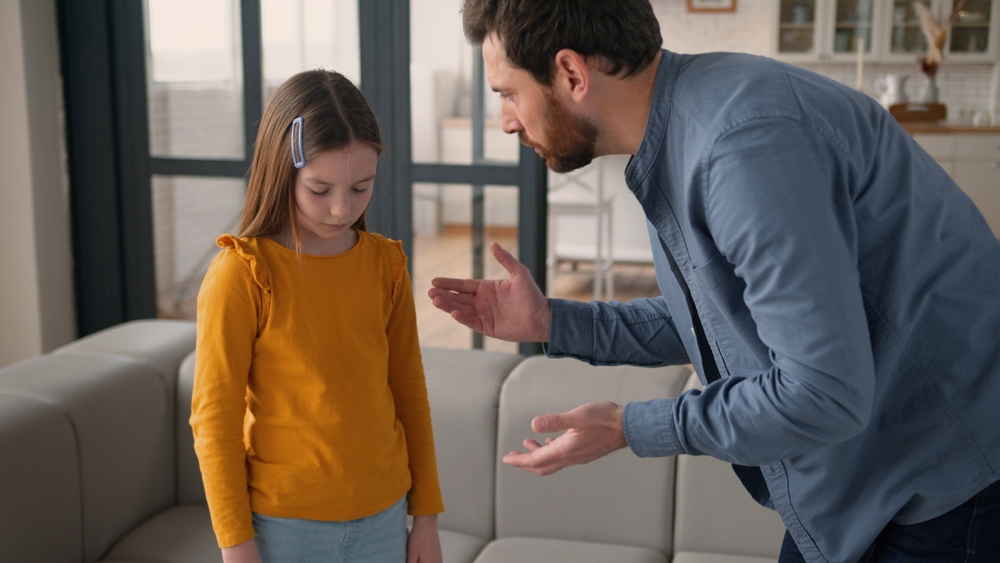Parenting often involves balancing discipline, guidance, and love—but sometimes, even well-meaning parents make emotional missteps without realizing it. One of the most overlooked is gaslighting your kid. It happens subtly, often disguised as protecting feelings or maintaining authority, yet it can leave lasting effects on a child’s confidence and emotional growth. Recognizing these patterns is the first step to building trust, empathy, and healthy communication with your child.
1. Dismissing Their Feelings to Keep the Peace
Many parents unintentionally start gaslighting your kid when trying to diffuse strong emotions. Saying things like “You’re fine” or “That’s nothing to cry about” might seem harmless, but it tells children their emotions are wrong or exaggerated. Over time, kids may stop expressing how they truly feel, believing their emotions are invalid. A healthier response is acknowledging their feelings—“I see you’re upset; that must be hard.” This approach teaches emotional awareness and fosters open communication.
2. Rewriting Events to Avoid Accountability
Sometimes, parents alter the truth to steer a conversation or protect their authority. Phrases like “I never said that” or “You’re remembering it wrong” can be subtle forms of gaslighting your kid. Even if unintentional, denying a child’s experience teaches them to doubt their own memory or perception. When disagreements arise, it’s better to model accountability by saying, “I might have misspoken” or “Let’s talk through what we each remember.” Admitting small mistakes strengthens your credibility and shows children that honesty matters more than perfection.
3. Using Sarcasm That Undermines Confidence
Playful teasing can quickly cross into harmful territory when it targets insecurities or emotions. Comments like “Wow, someone’s dramatic today” or “You’re acting like a baby” can make children question whether they’re too sensitive or incapable. This is another subtle form of gaslighting your kid because it shifts focus from their feelings to their perceived overreaction. Kids who experience this may withdraw or overanalyze every emotional response. Using humor kindly and teaching self-reflection instead of mockery helps build self-esteem rather than eroding it.
4. Minimizing Their Problems Because They Seem Small
It’s easy to underestimate a child’s struggles simply because they appear minor compared to adult issues. But telling a child, “You’ll forget about this tomorrow” or “That’s not a big deal” communicates that their experiences don’t matter. When parents minimize emotions, they’re unintentionally gaslighting your kid into believing their challenges aren’t worth discussing. Every problem is relative to a child’s world, and validating their worries builds emotional resilience. Listening without judgment shows children their voice has value.
5. Overriding Their Reality in the Name of “Tough Love”
Parents sometimes believe that being firm or “tough” prepares children for real life. But statements like “You’re overreacting” or “That didn’t hurt that bad” dismiss a child’s lived experience. This approach often starts as discipline but can evolve into gaslighting your kid by denying what they feel or sense. Instead, balance toughness with empathy by acknowledging emotion before addressing behavior. Teaching that feelings are real—but not always a reason for certain actions—strikes a healthy emotional balance.
6. Comparing Them to Others to Control Behavior
Comparison might seem motivational, but it often chips away at self-worth. Saying “Your brother never complains” or “Other kids don’t act like this” can make a child doubt their emotions or identity. It’s a subtle form of gaslighting your kid because it suggests their natural reactions are wrong. Over time, this creates shame and internal conflict instead of accountability. Encouraging growth by focusing on their personal progress nurtures intrinsic motivation and confidence.
7. Ignoring Apologies or Overriding Their Boundaries
When a child apologizes and a parent responds with “That’s not good enough” or “You don’t mean it,” it can create confusion and mistrust. Similarly, forcing physical affection after a child says no—like insisting they hug a relative—can unintentionally gaslight them into ignoring their own boundaries. These actions teach kids that their words and comfort levels don’t matter. Respecting apologies and personal space shows that you honor their autonomy. It helps them develop healthy emotional boundaries that last into adulthood.
8. Saying “You Made Me Do This” During Discipline
When parents shift responsibility for their actions onto their child—such as saying “You made me yell” or “If you behaved, I wouldn’t get mad”—it blurs accountability. This form of gaslighting your kid teaches them to internalize guilt for someone else’s emotions. It also makes them fear emotional outbursts rather than understanding the cause of discipline. Reframing statements to take ownership, like “I’m upset because I care about your safety,” models emotional maturity. It teaches children that accountability and compassion can coexist.
How Awareness Builds Stronger Parent-Child Trust
Realizing you’ve been gaslighting your kid unintentionally isn’t about blame—it’s about growth. Every parent slips into these habits occasionally, especially when stressed or overwhelmed. What matters most is the willingness to notice and change. By validating your child’s feelings, owning your words, and fostering open dialogue, you create an environment built on trust rather than fear. The goal isn’t perfection—it’s connection, honesty, and raising emotionally confident kids who feel seen and heard.
Have you caught yourself saying something you didn’t realize could be emotionally invalidating? Share your insights or experiences in the comments below!
What to Read Next…
6 Parenting Phrases Experts Say Cause Long-Term Insecurity
9 Parenting Trends That Are Quietly Harming Emotional Growth
10 Phrases That Unintentionally Shame Your Child in Public
8 Things Parents Say That Create Lifelong Guilt
10 Parenting Phrases That Do More Harm Than Good
The post Are You Guilty of Gaslighting Your Kid Without Realizing It? appeared first on Kids Ain't Cheap.








